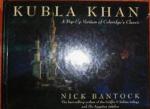|
This section contains 6,329 words (approx. 22 pages at 300 words per page) |

|
SOURCE: Bahti, Timothy. “Coleridge's ‘Kubla Khan’ and the Fragment of Romanticism.” Modern Language Notes 96, no. 5 (December 1981): 1035-50.
In the following essay, Bahti evaluates “Kubla Khan” as it encapsulates the self-fragmenting quality of Romanticism.
I wrote reflections that, in many ways, were even stronger than their origin.
—Derek Walcott
[Der] negative Sinn … entsteht, wenn einer bloß den Geist hat, ohne den Buchstaben; oder umgekehrt. …
—Friedrich Schlegel1
When Coleridge's “Kubla Khan” appeared in 1816, the contemporary reviewers spoke of the poem's “nonsense.” This “nonsense” was immediately related to the ostensibly partial character of the poem: it was not wholly a meaningful poem, but only meaningless music; or else, Coleridge had dared too much, and therefore succeeded at only little, or even nothing at all, that was meaningful.2 Even when the poem was soon judged very positively, the discussion remained within the confines of the question of partiality and meaning: “Kubla Khan...
|
This section contains 6,329 words (approx. 22 pages at 300 words per page) |

|


